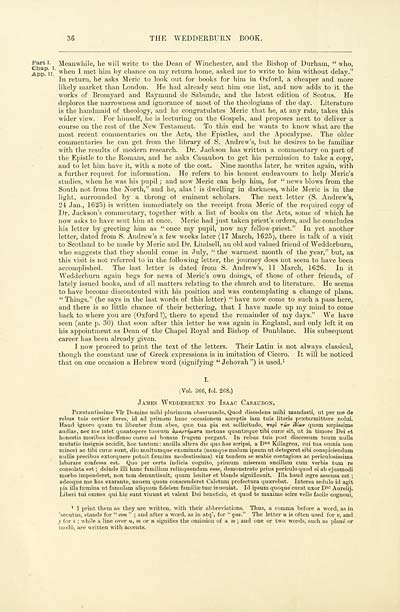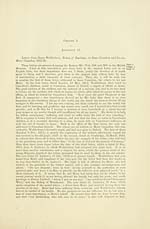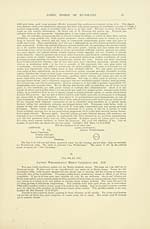Wedderburn book > History
(128) Page 36
Download files
Complete book:
Individual page:
Thumbnail gallery: Grid view | List view

36 THE WEDDERBURN BOOK.
Parti. Meanwhile, he will write to the Dean of Winchester, and the Bishop of Durham, "who,
App P ii when I me t him by chance on my return home, asked me to write to him without delay.''
In return, he asks Meric to look out for books for him in Oxford, a cheaper and more
likely market than London. He had already sent him one list, and now adds to it the
works of Bromyard and Raymund de Sabunde, and the latest edition of Scotus. He
deplores the narrowness and ignorance of most of the theologians of the day. Literature
is the handmaid of theology, and he congratulates Meric that he, at any rate, takes this
wider view. For himself, he is lecturing on the Gospels, and proposes next to deliver a
course on the rest of the New Testament. To this end he wants to know what are the
most recent commentaries on the Acts, the Epistles, and the Apocalypse. The older
commentaries he can get from the library of S. Andrew's, but he desires to be familiar
with the results of modern research. Dr. Jackson has written a commentary on part of
the Epistle to the Romans, and he asks Casaubon to get his permission to take a copy,
and to let him have it, with a note of the cost. Nine months later, he writes again, with
a further request for information. He refers to his honest endeavoiu-s to help Meric's
studies, when he was his pupil ; and now Meric can help him, for " news blows from the
South not from the North," and he, alas ! is dwelling in darkness, while Meric is in the
light, surrounded by a throng ot eminent scholars. The next letter (S. Andrew's,
24 Jan., 1625) is written immediately on the receipt from Meric of the retpiired copy of
Dr. Jackson's commentary, together with a list of books on the Acts, some of which he
now asks to have sent him at once. Meric had just taken piriest's orders, and he concludes
his letter by greeting him as " once my pupil, now my fellow-priest." In yet another
letter, dated from S. Andrew's a few weeks later (17 March, 1625), there is talk of a visit
to Scotland to be made by Meric and Dr. Lindsell, an old and valued friend of Wedderburn,
who suggests that they should come in July, "the warmest month of the year," but, as
this visit is not referred to in the following letter, the journey does not seem to have been
accomplished. The last letter is dated from S. Andrew's, 11 March, 1626. In it
Wedderburn again begs for news of Meric's own doings, of those of other friends, of
lately issued books, and of all matters relating to the church and to litei'ature. He seems
to have become discontented with his position and was contemplating a change of plans.
" Things," (he says in the last words of this letter) " have now come to such a pass here,
and there is so little chance of their bettering, that I have made up my mind to come
back to where you are (Oxford 1), there to spend the remainder of my days." We have
seen (ante p. 30) that soon after this letter he was again in England, and only left it on
his appointment as Dean of the Chapel Royal and Bishop of Dunblane. His subsequent
career has been already given.
I now proceed to print the text of the letters. Their Latin is not always classical,
though the constant use of Greek expressions is in imitation of Cicero. It will be noticed
that on one occasion a Hebrew woi-d (signifying " Jehovah ") is used. 1
(Vol. 366, fol. 268.)
James Wedderburn to Isaac Casaubon.
Prsestantissime Vir Domine mibi plurimum obseruande, Quod diseedens mihi raandasti, ut per me de
rebus tuis certior fieres, id ad primatn bauc occasionem aceeptis iam tuis Uteris pratermittere nolui.
Haud ignoro quam tu libenter dum abes, quoe tua pia est sollicitudo, irepl t<Si> tfilov quam ssepissime
audias, nee me iatet quantopere tuorura a/iaprtj/tiiTa metuas quantseque tibl cura? sit, ut iu timore Dei et
honestis moribus inoftenso cursu ad bonam frugem pergant. In rebus tuis post discessum tvium nulla
mutatio insignis accidit, hoc tantum: ancilla altera die quo has scripsi, a D na Killagreu, cui tua omnia non
minori ac tibi curae sunt, diu multumque examinata (namque malum ipsum ut detegeret sibi conspiciendum
nullis precibus extorquere potuit ftemina modestissima) vix tandem se scabie contagiosa ac periculosissima
laborare confessa est. Quo per certa indicia cognito, primum miseram ancillam cum verbis turn re
consolata est ; deinde illi banc familiam relinquendam esse, demonstrato prius periculoquod ei ab ejusmodi
morbo impenderet, non tarn denuntiauit, quam leniter et blande significauit. Ilia haud pegre assensa est ;
adeoque me has exarante, nauem quam conscenderet Caletum profectura qurerebat. Interea sedulo id agit
pia ilia ffemina ut famulam aliquam fidelem familipc tua; inueniat. Id ipsum quoque curat uxor D ni Aurelij.
Liberi tui omnes qui hie sunt viuunt et valent Dei benencio, et quod te maxime scire velle facile coguoui,
1 I print them as they are written, with their abbreviations. Thus, a comma before a word, as iu
'secutus, stands for " con " ; and after a word, as in atq', for " que." The letter u is often used for v, and
j for t ; while a line over «, m or n signifies the omission of a m ; and one or two words, such as plane or
modo, are written with accents.
Parti. Meanwhile, he will write to the Dean of Winchester, and the Bishop of Durham, "who,
App P ii when I me t him by chance on my return home, asked me to write to him without delay.''
In return, he asks Meric to look out for books for him in Oxford, a cheaper and more
likely market than London. He had already sent him one list, and now adds to it the
works of Bromyard and Raymund de Sabunde, and the latest edition of Scotus. He
deplores the narrowness and ignorance of most of the theologians of the day. Literature
is the handmaid of theology, and he congratulates Meric that he, at any rate, takes this
wider view. For himself, he is lecturing on the Gospels, and proposes next to deliver a
course on the rest of the New Testament. To this end he wants to know what are the
most recent commentaries on the Acts, the Epistles, and the Apocalypse. The older
commentaries he can get from the library of S. Andrew's, but he desires to be familiar
with the results of modern research. Dr. Jackson has written a commentary on part of
the Epistle to the Romans, and he asks Casaubon to get his permission to take a copy,
and to let him have it, with a note of the cost. Nine months later, he writes again, with
a further request for information. He refers to his honest endeavoiu-s to help Meric's
studies, when he was his pupil ; and now Meric can help him, for " news blows from the
South not from the North," and he, alas ! is dwelling in darkness, while Meric is in the
light, surrounded by a throng ot eminent scholars. The next letter (S. Andrew's,
24 Jan., 1625) is written immediately on the receipt from Meric of the retpiired copy of
Dr. Jackson's commentary, together with a list of books on the Acts, some of which he
now asks to have sent him at once. Meric had just taken piriest's orders, and he concludes
his letter by greeting him as " once my pupil, now my fellow-priest." In yet another
letter, dated from S. Andrew's a few weeks later (17 March, 1625), there is talk of a visit
to Scotland to be made by Meric and Dr. Lindsell, an old and valued friend of Wedderburn,
who suggests that they should come in July, "the warmest month of the year," but, as
this visit is not referred to in the following letter, the journey does not seem to have been
accomplished. The last letter is dated from S. Andrew's, 11 March, 1626. In it
Wedderburn again begs for news of Meric's own doings, of those of other friends, of
lately issued books, and of all matters relating to the church and to litei'ature. He seems
to have become discontented with his position and was contemplating a change of plans.
" Things," (he says in the last words of this letter) " have now come to such a pass here,
and there is so little chance of their bettering, that I have made up my mind to come
back to where you are (Oxford 1), there to spend the remainder of my days." We have
seen (ante p. 30) that soon after this letter he was again in England, and only left it on
his appointment as Dean of the Chapel Royal and Bishop of Dunblane. His subsequent
career has been already given.
I now proceed to print the text of the letters. Their Latin is not always classical,
though the constant use of Greek expressions is in imitation of Cicero. It will be noticed
that on one occasion a Hebrew woi-d (signifying " Jehovah ") is used. 1
(Vol. 366, fol. 268.)
James Wedderburn to Isaac Casaubon.
Prsestantissime Vir Domine mibi plurimum obseruande, Quod diseedens mihi raandasti, ut per me de
rebus tuis certior fieres, id ad primatn bauc occasionem aceeptis iam tuis Uteris pratermittere nolui.
Haud ignoro quam tu libenter dum abes, quoe tua pia est sollicitudo, irepl t<Si> tfilov quam ssepissime
audias, nee me iatet quantopere tuorura a/iaprtj/tiiTa metuas quantseque tibl cura? sit, ut iu timore Dei et
honestis moribus inoftenso cursu ad bonam frugem pergant. In rebus tuis post discessum tvium nulla
mutatio insignis accidit, hoc tantum: ancilla altera die quo has scripsi, a D na Killagreu, cui tua omnia non
minori ac tibi curae sunt, diu multumque examinata (namque malum ipsum ut detegeret sibi conspiciendum
nullis precibus extorquere potuit ftemina modestissima) vix tandem se scabie contagiosa ac periculosissima
laborare confessa est. Quo per certa indicia cognito, primum miseram ancillam cum verbis turn re
consolata est ; deinde illi banc familiam relinquendam esse, demonstrato prius periculoquod ei ab ejusmodi
morbo impenderet, non tarn denuntiauit, quam leniter et blande significauit. Ilia haud pegre assensa est ;
adeoque me has exarante, nauem quam conscenderet Caletum profectura qurerebat. Interea sedulo id agit
pia ilia ffemina ut famulam aliquam fidelem familipc tua; inueniat. Id ipsum quoque curat uxor D ni Aurelij.
Liberi tui omnes qui hie sunt viuunt et valent Dei benencio, et quod te maxime scire velle facile coguoui,
1 I print them as they are written, with their abbreviations. Thus, a comma before a word, as iu
'secutus, stands for " con " ; and after a word, as in atq', for " que." The letter u is often used for v, and
j for t ; while a line over «, m or n signifies the omission of a m ; and one or two words, such as plane or
modo, are written with accents.
Set display mode to:
![]() Universal Viewer |
Universal Viewer | ![]() Mirador |
Large image | Transcription
Mirador |
Large image | Transcription
Images and transcriptions on this page, including medium image downloads, may be used under the Creative Commons Attribution 4.0 International Licence unless otherwise stated. ![]()
| Histories of Scottish families > Wedderburn book > History > (128) Page 36 |
|---|
| Permanent URL | https://digital.nls.uk/95652255 |
|---|
| Attribution and copyright: |
|
|---|---|
| Description | A selection of almost 400 printed items relating to the history of Scottish families, mostly dating from the 19th and early 20th centuries. Includes memoirs, genealogies and clan histories, with a few produced by emigrant families. The earliest family history goes back to AD 916. |
|---|

